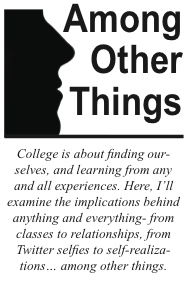
“Her? I unfollowed her. She takes too many selfies,” my 16 year old cousin said other day, in regards to a mutual friend’s Instagram account.
“She does, but she’ll keep posting similar pictures of herself every day. She gets a lot of likes and comments,” I responded.
Opinions on today’s selfie culture differ, and there are technically no right or wrong answers to the selfie questions. How many selfies are too many? When is the appropriate time to take a selfie? Is there a line to altering your face with Instagram filters? These are not yes-or-no questions.
Selfie is the Oxford Dictionary word of the year. According to ox- forddictionaries.com, a selfie is “a photograph that one has taken of oneself, typically one taken with a smartphone or webcam and up- loaded to a social media website: occasional selfies are acceptable, but posting a new picture of your- self everyday isn’t necessary.”
The example of word usage made me laugh. I happen to agree with it. A selfie every single day is in bad taste. That’s why my cousin and I sometimes go through our Instagram accounts together and judge people based on how many selfies they take per week and on the quality of said selfies. This judgment, however, does not make us any better than the excessive selfie-posters. In fact, it makes us hypocrites. I am guilty of partaking in the occasional “Selfie-Sunday” for no reason other than the fact that it’s Sunday and my makeup looks good. I have absolutely no authority to judge others on what they post and how often when I have the option to simply unfollow them on my Instagram account or, better yet, just not use Instagram so much. Still, I judge.
Often, when others or I post a selfie, it is not for any special reason. Often, people are just bored and perhaps looking for an excuse to procrastinate their homework for a little bit longer. Instead of doing anything meaningful or productive, they watch the “likes” and comments roll in. I am guilty of this; the selfie-post is a very easy way to procrastinate and temporarily raise self-esteem. But, the selfie is ultimately futile.
That isn’t the real me on the screen, I’ll think to myself after posting a selfie on a lazy Sunday. The front-facing camera makes my skin look clear, as does the Instagram filter. The filter makes my eyes look brighter and my jewelry sparkle. Do the people liking my photo actually like me in real life? If I saw them in person on that same Sunday, would they compliment my makeup, or is that interaction saved for the internet and the internet only? This is my problem with casual selfies and for selfies posted too often (which, in my opinion, is more than two posts a month.)
Selfies are simply a distrac- tion from real communication with people. They are a fast way to raise self-esteem for a matter of minutes, only to feel the need to post another selfie soon in a vain attempt to get more “likes” and false recognition of physical beauty. This cannot substitute for true self-confidence.
Interaction between humans is undoubtedly altered by social media on the internet. This is an issue that can be discussed much further. But for now, I’ll keep the discussion to the selfie. A selfie is fine for the occasional life-update or for a fun event or trip. But a selfie every day seems more like a cry for attention. A “hey! Look at me! Acknowledge my existence, even if I haven’t talked to you or seen you in years! #Nofilter be- cause I’m naturally pretty!”
This is wrong, at least in my opinion. The excessive selfie promotes self-centeredness. Photo filters and other tools promote the clear skin and sparkling eyes that are simply unattainable in real life.
Even a #nofilter photo can be falsified as the front camera on iPhones, in my opinion, are low quality and grainy which serves to make my skin look clearer than it would on another camera
So, put down the camera and look around at something besides your digital newsfeed, maybe compliment someone’s makeup in person instead of online.
